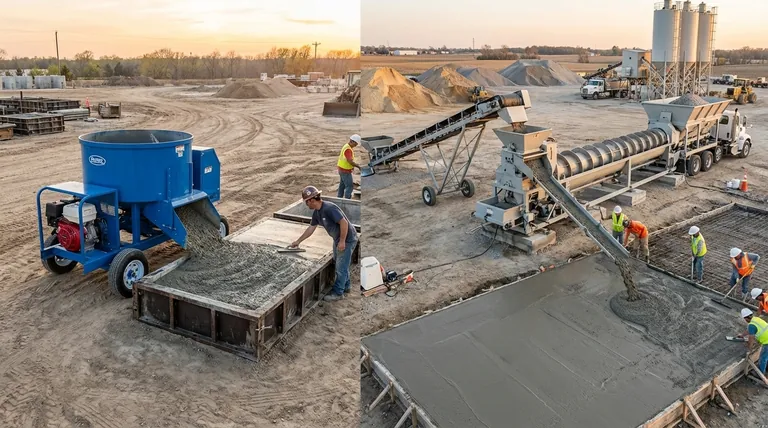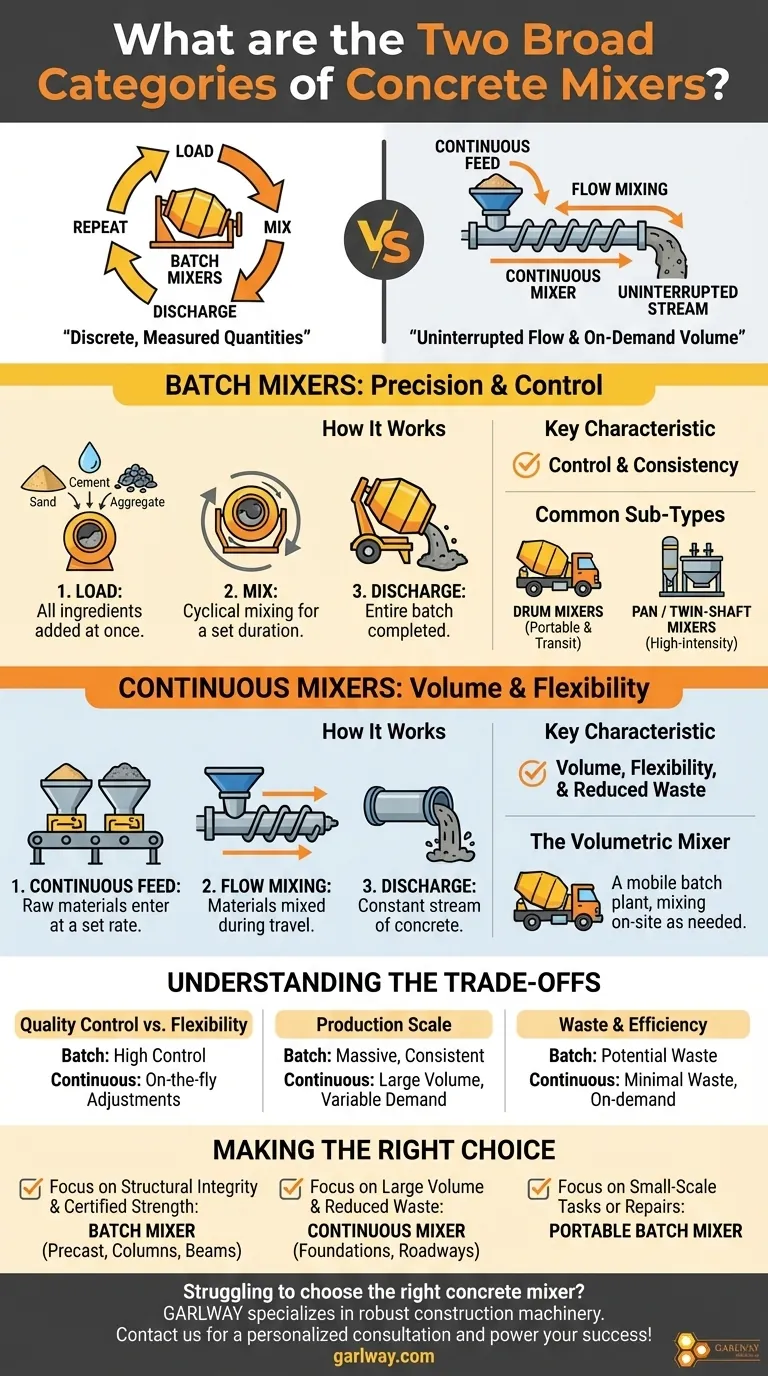To put it simply, the two broad categories of concrete mixers are batch mixers and continuous mixers. Batch mixers produce concrete one specific, measured quantity at a time, while continuous mixers create an uninterrupted stream of concrete by mixing materials as they flow through the machine.
The fundamental distinction between mixers is not their size or mobility, but their production method. Batch mixers are defined by creating discrete, finite volumes of concrete, offering precision. Continuous mixers are defined by their ability to produce an uninterrupted flow, offering on-demand volume and efficiency.

The Batch Mixer: Precision in Measured Quantities
A batch mixer is the most common type, defined by its process: all raw ingredients (cement, aggregate, sand, water) are loaded into the mixer at once, mixed for a specific duration, and then the entire completed batch is discharged.
How It Works
The entire process is cyclical. A batch is created, emptied, and then the mixer is reloaded to begin the next one. This method ensures that every batch receives the same mixing action for the same amount of time.
Key Characteristic: Control and Consistency
Because each batch is a discrete event, operators have extremely high control over the quality and consistency of the mix. This makes batch mixers the standard for projects requiring high-specification or structural-grade concrete.
Common Batch Mixer Sub-Types
- Drum Mixers: These are the most recognizable type, featuring a revolving drum with fins inside. They are common as portable mixers for small jobs and as the large transit mixers mounted on trucks.
- Pan and Twin-Shaft Mixers: These are high-intensity, stationary mixers often found in precast concrete plants. Their powerful mixing action creates a highly homogenous and strong concrete mix very quickly.
The Continuous Mixer: An Uninterrupted Flow
A continuous mixer, as its name implies, does not operate in cycles. Raw materials are fed into the machine continuously at a set rate, mixed as they travel through it, and discharged in a constant stream.
How It Works
Materials are typically stored in separate hoppers and fed into a mixing chamber (often an auger) via conveyor belts or screws. The machine keeps producing concrete until it is shut off.
Key Characteristic: Volume and Flexibility
The primary advantage is the ability to produce large volumes of concrete without interruption. Because materials are mixed on-demand, there is minimal waste, and the mix design can often be adjusted in real time.
The Volumetric Mixer
A volumetric mixer is a common and advanced type of continuous mixer. It is essentially a mobile batch plant on a truck, carrying unmixed materials to the job site and mixing concrete as needed. This eliminates the risk of concrete hardening during transit.
Understanding the Trade-offs
Choosing between these two methods involves clear trade-offs in control, speed, and waste management.
Quality Control vs. On-Site Adjustment
Batch mixers offer superior quality control for each specific batch, making them ideal for engineered mixes. Continuous mixers provide unmatched flexibility, allowing for on-the-fly adjustments and eliminating waste from over-ordering.
Production Scale
Stationary batch plants are built for massive, consistent production for major projects. Continuous (volumetric) mixers are perfect for projects where the exact volume is unknown or where work may be intermittent, such as large slab pours or remote construction sites.
Waste and Efficiency
Continuous mixers significantly reduce waste because you only produce what you need. A traditional batch mixer truck must discharge any unused concrete, which is often a costly and environmentally sensitive issue.
Making the Right Choice for Your Goal
Understanding the core production method helps you select the right equipment for your objective.
- If your primary focus is structural integrity and certified strength: A batch mixer is the industry standard for guaranteeing precise, repeatable mix designs for precast elements, columns, and beams.
- If your primary focus is large volume and reduced waste: A continuous (volumetric) mixer is ideal for foundations, roadways, and remote projects where concrete demand is high but potentially variable.
- If your primary focus is small-scale tasks or repairs: A small, portable batch drum mixer offers the control and convenience needed for producing small, manageable quantities of concrete.
Ultimately, selecting the right mixer means choosing the production process—controlled batches or on-demand flow—that best serves the specific demands of your project.
Summary Table:
| Category | Key Feature | Best For |
|---|---|---|
| Batch Mixers | Produce concrete in discrete, measured quantities | Projects requiring high-specification, structural-grade concrete (e.g., precast elements, columns) |
| Continuous Mixers | Produce an uninterrupted flow of concrete on-demand | Large-volume pours with variable demand, reducing waste (e.g., foundations, roadways, remote sites) |
Struggling to choose the right concrete mixer for your project's specific demands?
GARLWAY specializes in providing robust construction machinery, including concrete mixers and batching plants, for construction companies and contractors globally. Our experts can help you select the perfect equipment to ensure optimal quality, efficiency, and cost-effectiveness on your job site.
Contact GARLWAY today for a personalized consultation and discover how our solutions can power your success!
Visual Guide

Related Products
- Ready Mixer Machine for Construction Ready Mix Machinery
- Portable Concrete Mixer Machine Equipment for Mixing Concrete
- HZS35 Small Cement Concrete Mixing Batch Plant
- Commercial Construction Mixer Machine for Soil Cement Mixing Concrete
- Hydraulic Concrete Mixer Machine Cement Mixing Equipment for Mixture Concrete
People Also Ask
- What should be considered regarding the output of a concrete mixer? Match Capacity to Your Project Scale
- What was significant about Roscoe Lee's 1934 concrete mixer design? Pioneering Modular Construction Equipment
- What is the function of a concrete mixer machine? Achieve Consistent, High-Quality Concrete for Your Projects
- What is the average lifespan of a concrete mixer? Maximize Your Equipment's Lifespan & ROI
- Can a concrete mixer be used for mortar? Understanding the trade-offs for your project



















